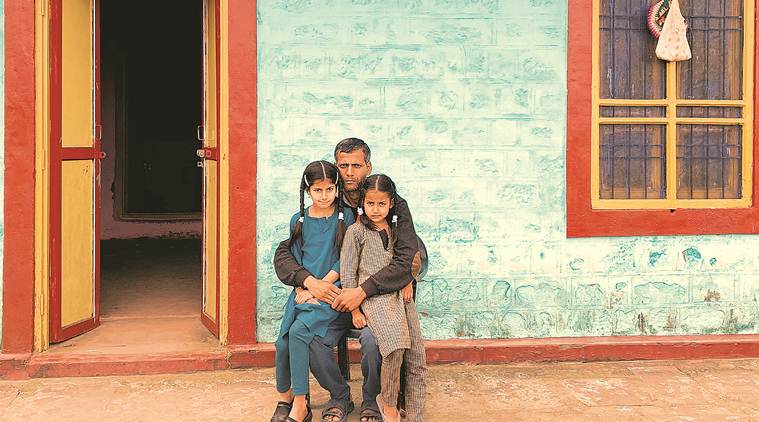 Susheel Kumar, who lost his three-year-old son, with his two daughters, in Jammu. (Photo: Arun Sharma)
Susheel Kumar, who lost his three-year-old son, with his two daughters, in Jammu. (Photo: Arun Sharma)
The Himanchal Pradesh police have booked the manufacturers of a cough and cold syrup for attempt to commit culpable homicide after laboratory reports confirmed the presence of a poisonous compound in a batch of the syrup which has allegedly caused the deaths of at least nine infants in Jammu between December and January. The firm’s license has also been suspended.
“The report of the government analyst in Chandigarh has found more than 34 per cent diethylene glycol (DEG) in the samples of Coldbest PC taken from Jammu and Haryana. Immediately after receipt of reports on Monday, an FIR was registered against Digital Vision, Kala Amb on the complaint of the assistant drugs controller,” Chief Minister Jai Ram Thakur said during the ongoing session of Himachal Pradesh Assembly on Tuesday.
The FIR was registered at Kala Amb police station in Sirmaur district. Besides J&K and Himachal Pradesh, the syrup had also been sold in Uttarakhand, Haryana, Uttar Pradesh, Meghalaya, Tripura and Tamil Nadu, said State Drugs Controller Navneet Marwah.
The accused include Parshottam Goyal and Konic Goyal, owners cum managing directors of the ‘pharma franchisee’ company, which according to its website has 250 employees with an annual turnover of Rs 45 crore.
Thakur said the manufacturer has been booked under section 18(a)(i) of the Drugs and Cosmetics Act, read with section 17(a) dealing with adulterated medicines. These offences are punishable under section 27A, which carries a prison term ranging from 10 years to life.
“Section 308 of the IPC, dealing with attempt to commit culpable homicide, has also been added to the FIR and the manufacturer’s licence has been suspended,” said the chief minister. Earlier, the Nahan licensing authority had already stopped all manufacturing at Digital Vision on February 17.
Marwah said a “deep investigation” is underway to ascertain the source of DEG, a toxic solvent known to cause acute renal failure, which was used to adulterate the medicine and whether or not the usage was accidental. “Use of this compound in drugs and medicines is banned in India,” he added.
Another official said that propylene glycol (PG) is the commonly used solvent in drugs. Physical properties of diethylene glycol are similar to PG, and replacement of one by the other in drugs and food products has caused deaths in many countries.
According to an article in the Journal of Public Health Policy, the use of DEG has been implicated in at least 12 medication-associated mass poisonings across the globe in the last 70 years. In India, 14 patients in Mumbai died in 1986 after being administered glycerine contaminated with DEG, and in 1998, at least 33 children in Gurgaon died due to DEG poisoning, said a WHO report. It added that in the USA, the deaths of more than 100 people due to a similar poisoning were recorded in 1937, leading to stringent legislations on drug safety.
The adulterated batch, manufactured last September by Digital Vision, contained 5,575 units. Of these, 3,447 bottles were sold in eight states by the time authorities started withdrawing the batch from the market after an alert by PGI in January.
Of the remaining 2,128 units, 657 have been collected from sampling, 565 have been ‘returned’ to the manufacturer and stocks of 906 units were sealed, officials said.
Around 1,350 bottles of the syrup were sold in Jammu, where the tragedy occurred. Of these, 486 were recalled or withdrawn following the alert while the remaining units had already been sold.